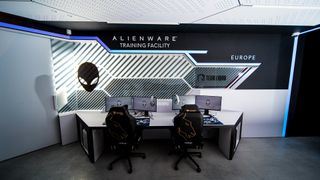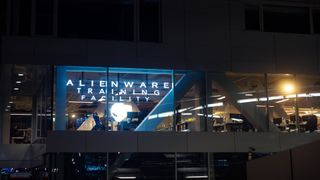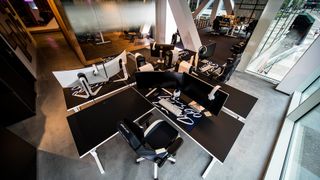Team Liquid's Alienware training facility is out of this world – and more are on the way
The future of esports is already here

The city of Utrecht in the Netherlands isn't likely to spark recognition from many folk outside of Europe. Unless that is, you're involved in the ever-expanding world of esports, an entire genre of competitive gaming that rarely gets a mention on mainstream news and TV. While Utrecht is typically known for its beautiful canals and great history, its also now home to the Alienware Training Facility, the European headquarters for Team Liquid.
For the unfamiliar, Team Liquid is one of the largest esports organizations in the world, covering everything from Super Smash Bros to Counter-Strike: Global Offensive. In fact, Team Liquid's roots actually started back in Utrecht over two decades ago, founded in the bedroom of co-CEO Victor Goossens – so while the location may appear unconventional for one of the largest team names in competitive gaming, many of them would just consider it to be home 2.0.
The Utrecht-based training facility isn't the only global headquarters for the esports giants, who have another HQ in Los Angeles, but it's certainly a breathtaking campus. I spoke to Jason Lucas Luijckx, the Senior Partnerships Manager for Team Liquid, to learn more about the future of their industry and the careful design choices that went into building the Alienware Training Facility.
If you haven't watched the video tour of the training facility located below, I implore you to do so. Its design is somehow both outlandish and tasteful, blending modern design aspects like LED strip lighting with living plants, bamboo-sourced wood and clean, white walls.
This is a building that looks like it would be more at home housing some of the world's best-paid traditional sports stars rather than what many people may judge as just 'a bunch of gamers', but its creation and necessity is a testimony to just how far the esports industry has come, regardless of its apparent underground appeal to some older audiences.
When I mentioned this, I was quickly corrected by Luijckx – just because the industry doesn't get the same coverage on traditional TV or print doesn't mean the appeal of esports is by any means underrepresented.
Esports vs tradition
Esports still feels like such a niche industry for anyone outside of the gaming sphere, but you guys can fill stadiums, and your training facility is cooler than most I've seen in a sports environment. With popularity rising, do you see Esports rivaling the traditional sports industry, and how soon do you think this will happen?
Luijckx laughs as he replies "Absolutely. In the US for example, League of Legends alone is already considered the 4th biggest 'sport' in terms of viewership. The LoL World Championship pulls more viewers than the Superbowl. And that's just one game! Team Liquid competes in over 17 different games."
If I had to pick the business advice I've heard the most, it would be to diversify your portfolio, something that Team Liquid has done beautifully. They compete in world tournaments for popular games like Fortnite, Apex Legends and Rocket League, and this adaptability has made them one of the most successful esports teams in the world.
"Viewership is normally one of the most important metrics, and for viewership, I would say that esports is already rivaling traditional sports. Do I see it getter bigger than football (soccer) over the next ten years? Probably not, but in places like the US, League of Legends is already bigger than the National Hockey League" states Luijckx.
He goes on to point out that the two worlds are also merging, with plenty of high profile sporting investors such as Team Liquid's own investor group aXiomatic Gaming sharing ties between the new and traditional sporting genres. For example, Peter Guber, co-Executive Chairman and Co-Founder of aXiomatic also owns the LA Dodgers and LAFC.
Luijckx also proudly says "We also recently signed a WNBA (Women's National Basketball Association) player, Aerial Powers. She won the WNBA championship last year, and she's an avid streamer and gamer who plays for Team Liquid in addition to the WNBA." (Powers signed with Team Liquid in January after playing in its Valorant Pro-Am tournament in early 2020, per Esports Insider.)
Get daily insight, inspiration and deals in your inbox
Get the hottest deals available in your inbox plus news, reviews, opinion, analysis and more from the TechRadar team.
A high-tech building for a high-tech industry

The new facility is gorgeous! How it is used by one of your teams in a typical day?
Luijckx explained "When the architects built it, it was very important for us that it was built in a sustainable way. There are solar panels everywhere, we have a wild nature garden on the roof. They call it a Micro-city because it's mixed-use."
Team Liquid has a dedicated office within this monument to sustainable architecture, along with 13 luxury apartments to house players. This requirement is apparent when you consider that the life of an esports player is hardly a typical 9-5 job. Late starts are required, often due to streaming requirements so training starts in the afternoons.
As you'll see in the tour video, a professional chef is located on-site to prepare meals for the team, and fully decked-out streaming pods are available outside of training for the players, equipped with the latest Alienware hardware.
"There are also scrim rooms that have seven setups to sit five players, a coach and a manager." Luijckx continues "They'll often have a full eight-hour schedule for the day that typically consists of practice with aim-training maps or finger exercises, scrims (or friendly games with other teams) and then an evening off, but some players will use their free evenings to stream to their fans".
Looking around the facility tour, there are a lot of big brands being represented there – Dell Alienware (obviously), SecretLabs, Monster Energy...how important are these brand partnerships with you guys? What are a few deciding factors that sway your allegiances?
"We definitely only want to use the best" replies Luijckx, "though I think the definition of best is always subjective...for us, the key thing we look at is the mission and vision of a company. Team Liquid has been in business for over 20 years now, and we've always been seen as a more mature and professional esports team than some of the organizations you might see popping up in games like Fortnite. It's very important to us that our brands are aligned with Team Liquid of a mission and vision perspective.
"What's really cool is if you look at our partners, excluding very recent additions, most of them have been with us for many years. Dell especially has been partnered with Team Liquid for ten years now, and we generally don't have short partnerships because we select at a very top level and ensure they're aligned with what we want to achieve."
What does the future hold?

Dell has a fantastic environmental ethos, and that seems to be something that you guys also care deeply about - can you talk us through some of the sustainability and recycling that was built into the facility?
"Renewable materials were super important for us" states Luijckx, "The facility was built for Team Liquid, but with our partner Dell, so many aspects of its Legend ID design language in mind. All the wood is bamboo-based, the acoustic panels on the ceiling are made with 100% recycled PET plastics. We even use a heat circulation system that takes fumes and hot air from the stove in the kitchen, and that energy is then used the heat the facility."
A point is also raised over the health of the players living and training in such a facility. The image of a 'pro gamer' in many older minds will be a greasy teenager, huddled over a PC for days at a time, but Team Liquid are keen to step away from that image, not because it's not the current reality for professional esports players, but seemingly because it can quickly become too accurate.
"A few years ago, the standards for esports was that players lived in 'gaming houses', traditionally a two-bedroom space with bunk beds per room, and then a gaming room setup in the living space where players would be there for 16 hours a day, right next to each other and living on pizza and energy drinks." Luijckx's face resembles my own, grimacing slightly at the thought.
"That stereotype doesn't apply anymore. We have a large lounge, with a living plant wall at the facility, with seasonal plants that change throughout the year and provides oxygen and peace to the environment. It was very important to support not just bodily health, but the mental health of our players too"
This is the second training facility built by Team Liquid - early days, but do you have a dream location for a third?
I'll admit, Luijckx looks both excited and nervous to answer my final question, giggling "how do I say this...we're definitely looking into building an additional facility, and we're scouting locations already. I can't reveal where, but I can say the new training facility will be on another continent and that we will be coming to where a lot of our fans are."
He drilled home that "our fans are super important to us, so for a next Alienware Training Facility, whenever that may come, it will come to a space where our fans are super excited to have us."
My time spent asking Luijckx questions certainly has me excited not just for the future of Team Liquid, but for the development and reach of esports in the coming years. The industry has exploded in such a relatively short amount of time, with prizes and tournaments that would likely blow the minds of an older generation of people who are more than likely completely oblivious to its existence.
If you're looking to adapt with the future of the sporting industry, you're safe to keep watching your favorite soccer or basketball teams, but you may want to consider turning into a few league matches of Apex Legends or Smash Bros.
Jess is a former TechRadar Computing writer, where she covered all aspects of Mac and PC hardware, including PC gaming and peripherals. She has been interviewed as an industry expert for the BBC, and while her educational background was in prosthetics and model-making, her true love is in tech and she has built numerous desktop computers over the last 10 years for gaming and content creation. Jess is now a journalist at The Verge.
Most Popular


